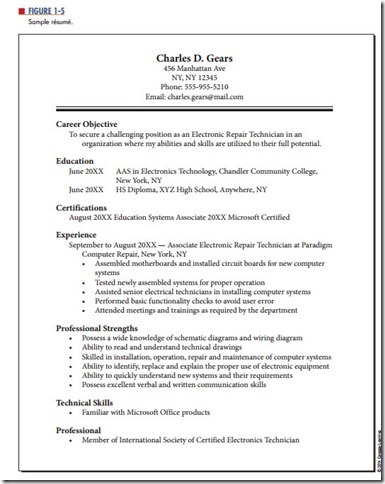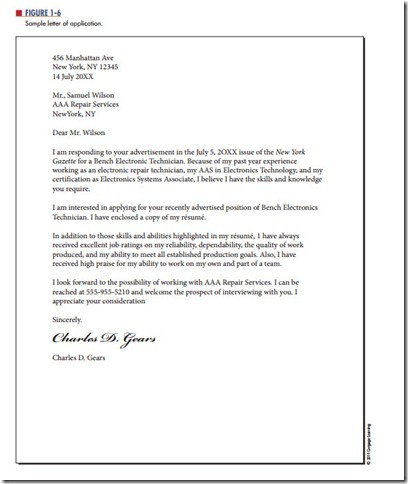Preparation For employment
The best job for an individual is one that matches his or her interests and abilities. When first thinking about a job, think of the following individual traits:
● Abilities—skill developed through school or training.
● Aptitude—focuses on natural abilities.
● Interests—things done for personal interest or enjoyment.
● Personality—identifies how well one relates to others.
Matching personal traits against available jobs is an important next step (Figure 1-4). Identifying a job title can be accomplished using the Dictionary of Occupational Titles (DOT) and the Occupational Outlook Handbook produced by the U.S. Department of Labor. Both of these documents are valuable resources when looking for a job. Electronics technicians are expected to repair, maintain, and test electronics equipment. Titles for electronics technicians are often expanded and may include the following:
● Computer electronics technician
● Field electronics technician
● Metrology electronics technician
● Bench electronics technician
● Senior electronics technician
Once you identify an appropriate job, you can begin to identify the skills you need to succeed in that job. To obtain the necessary job skills may require attending a technical school or college or an evening program, join- ing the military, or attending an apprentice program. Some jobs may require a four-year degree. It should be pointed out that the first job may lead to other jobs requiring different skills. Jobs could be changed four to five times over a lifetime of employment.
Once the skills are obtained, it’s time to search the job market. Jobs may come from friends, teachers, in- structors, classified ads, an Internet search, or a com- bination of all these techniques.
A basic résumé (Figure 1-5) should include the following information:
● Personal contact information—Include your name, address, phone number and e-mail address. A note on e-mail addresses: Keep them related to your
name. Do not use complex or cute names for your résumé. Avoid names such as “2hot4u,” “iluvchevy,” “tinytim,” and so on.
● Career objective—This is not mandatory. It is a personal decision whether to include it.
● Education—Electronics technician positions require at least an associate degree. If you lack the minimum education, you are unlikely to be granted an interview. Most employers perform
background checks to verify any education claims.
● Work experience—List any related job held, in a reverse chronological order, with job title, employer, employer address, time period worked, and duties and responsibilities.
● Accomplishments—Itemize accomplishments and achievements.
● References—Most résumés show that references are available by adding the phrase “References sup- plied on request.” It’s best to have asked three or four people to supply references.
There are many different opinions for what to in- clude on a résumé, but this list represents the basics. When writing your résumé, avoid complete sentences and first-person pronouns. Your résumé should focus on the highlights of your achievements—it should not read like an autobiography. Try to limit the résumé to one page, and concentrate on your achievements, not your responsibilities. Use key words that describe the position you are applying for.
When you send your résumé to an employer, you must include a letter of application, or cover letter (Figure 1-6). The letter of application is specific to the job you are applying for and must be brief and to the point. It includes the following parts:
● Introduction—Identify the job you are applying for and how you discovered the opportunity.
● Discussion—Discuss your work experience, education, and professional skill. Do not replicate the attached résumé.
● Conclusion—Express your desire to meet to dis- cuss employment opportunities. Offer your contact information, and thank your reader for the opportunity to apply.
The letter of application and résumé are sent to the contact person in a classified ad or to the person who has the ability to hire. If the contact person is not known, call the employer and find out whom to send it to. Many larger employers now use an online application process, but you can still apply many of the
same résumé-building and letter-writing techniques to present your qualifications online.
The résumé serves another purpose as well, because many employers want their own job application filled out. In such cases, much of the information can be taken off the résumé. Read the full job application before filling it out, and write clearly and carefully when filling it out.
The job interview is an important follow-up on a successful résumé and job application (Figure 1-7). An interested employer wants to know more information. Learn everything you can about the employer before the interview. Dress appropriately for the interview, cover any tattoos, and wear clothes that are clean and pressed, with clean and neatly styled hair. Attend the interview alone. After the interview, be sure to send a follow-up letter thanking the employer for the opportunity to be interviewed.
When a job is offered, it is important to find out about the start date, working hours, salary, vacation days, and benefits. It is a personal decision to accept or reject a job, but it must be done in a timely fashion. Regardless of the situation, always be polite and considerate.
To be successful at the job will require hard work and attention to the following:
● Dress appropriately.
● Be on time and have good attendance.
● Be responsible for your actions.
● Be honest.
● Be enthusiastic.
● Display a proper attitude.
A job interview allows an employer to learn more about a prospective candidate as a future employee.
On the job, work hard, cooperate with others, and avoid gossiping, to increase productivity.
Questions
1. What four traits should be considered when thinking about a job?
2. list titles for electronics technicians.
3. Where can the necessary skills to become an electronics technician be obtained?
4. list the parts of a basic résumé.
5. What traits are required to be successful at a job?



